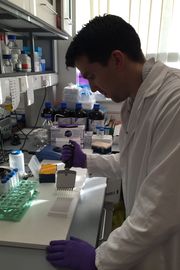Cardiovascular Disease Research
Latest Research
Research Archive
- Research articles from 2025
- Research articles from 2024
- Research articles from 2023
- Research articles from 2022
- Research articles from 2021
- Research articles from 2020
- Research articles from 2019
- Research articles from 2018
- Research articles from 2017
- Research articles from 2016
- Research articles from 2015
- Research articles from 0
« Back to Cardiovascular Disease Research
The characterisation of vascular biomarkers and body composition before and after cardiac resynchronisation therapy in patients with chronic heart failure and their role in predicting response.
Heart failure is a common and disabling condition which has a higher death rate than most cancers. The problem continues to expand, despite really effective medical treatments. When patients develop heart failure their heart shape and function alters for the worse. Recently a new treatment called Cardiac Resynchronisation Therapy or CRT has been developed that is very good at reducing the number of deaths and hospital admissions due to heart failure. CRT is a device that is implanted with leads that go to the heart and resynchronise it and causing the shape and function to improve. Unfortunately not all heart failure patients see this benefit and it is estimated that 3 in 10 see no benefit at all.
The focus is now on identifying these ‘non-responders’. A key area of research in this area is heart biomarkers found in the blood stream that represent the heart shape and function. These ‘biomarkers’ change in heart failure and represent the changes seen in the heart. Several ‘biomarkers’ have been examined in small studies in heart failure patients undergoing CRT to see how they change and whether there is any potential clinical value. Some studies have shown good promise and others have shown conflicting results. There is potential benefit to look at a group of markers where their true clinical value is unknown. These ‘biomarkers’ have traditionally been studied in a simple blood test taken from a vein in a limb. During the CRT procedure one of the leads is placed in the main heart vein (coronary sinus) and provides the opportunity to study blood from the heart directly. There is limited evidence to say ‘biomarkers’ are more useful to look at the chances of responding to treatment.
Our study is the start of a process to see if heart failure need specific ‘biomarkers’ taken before a CRT implant are useful in calculating their chances of a response. This small study will look to see if any of our specific markers show a link to response and will be used to drive a bigger trial that might mean these ‘biomarkers’ should be used clinically.
Dr McAloon has won a national prize for this clinical research work. See 'News' item.
Article in press : The American Journal of Cardiology
http://www.ajconline.org/article/S0002-9149(16)30232-6/abstract
Safety and cost-effectiveness of same-day cardiac resynchronization therapy and implantable cardioverter defibrillator implantation
Gavin Atherton, BSc (Hons), MB ChB, Christopher James McAloon, MB ChB, MRCP, PGCME, Bhaveek Chohan, BSc (Hons), Dominic Heining, MSci, MB ChB, Benjamin Anderson, MB ChB, MRCP, Jethro Barker, BSc (Hons), Harpal Randeva, MB ChB, PhD, FRCP, Faizel Osman, MB BCh MD, FRCP, FESC





